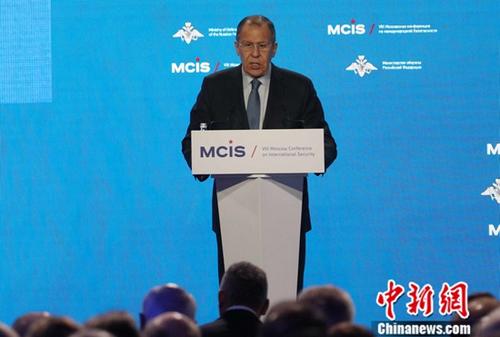Chinanews.com, April 13th. According to a Russian satellite network report on the 13th, Russian Foreign Ministry spokesperson Zakharova said that Moscow hopes that the incident at Iran’s Natanz nuclear facility will not disrupt the negotiation process aimed at resuming full implementation of the Iran nuclear agreement .
Iranian Foreign Minister Zarif said in a meeting with Russian Foreign Minister Lavrov that Iran is grateful to Russia for condemning the Natanz incident.
On April 11, the distribution network of Iran’s Natanz nuclear facility failed.
Ali Akbar Salish, chairman of the Iranian Atomic Energy Organization, said the incident was "an expression of nuclear terrorism."
According to the "New York Times" quoting sources, the accident at the Natanz nuclear facility was caused by an explosion organized by Israel.
Salehi said on the 12th that the sabotage did not stop the uranium enrichment process at the Natanz nuclear facility.
Data map: Iran's Arak heavy water reactor.
Russian Foreign Ministry spokesperson Zakharova pointed out that Moscow is concerned about how the situation will affect multilateral efforts to resume the full implementation of the Iran nuclear agreement.
Zakharova said, “We are paying close attention to media reports on the situation at the Natanz uranium enrichment plant and Iranian statements. We believe that the cause of this serious incident will be carefully investigated by Iran.”
She said: "It is not only the threats to nuclear and radiological safety that are worrying—fortunately, Iranian experts have professionally eliminated these threats in a timely manner. If it is proven that this is indeed caused by malicious acts, this conspiracy should be strongly condemned. "
Zarif said during talks with Russian Foreign Minister Lavrov: "We should thank the Russian side for condemning the Natanz sabotage."
Data map: Russian Foreign Minister Lavrov.
Photo by China News Agency reporter Wang Xiujun
A face-to-face meeting at the political director-general level of the Joint Committee on the "Joint Comprehensive Action Plan" on the Iranian nuclear issue was held in Vienna last week.
This week, mid-term negotiations will continue.
In July 2015, Iran and the six countries on the Iranian nuclear issue, the United States, Britain, France, Russia, China, and Germany, reached a "Joint Comprehensive Action Plan" to resolve the Iranian nuclear issue.
When the agreement is fulfilled, the UN Security Council, the United States and the European Union should completely lift the economic and financial sanctions on Iran.
However, in May 2018, the Trump administration of the United States announced its unilateral withdrawal from the Iran nuclear agreement and comprehensively restored sanctions against Iran in phases, including secondary sanctions against countries that do business with Iran.
According to the "Strategic Measures to Lift Sanctions" adopted by the Iranian Parliament and entered into force at the end of 2020, on February 23, 2021, Iran has suspended the implementation of the Additional Protocol to the Treaty on the Non-Proliferation of Nuclear Weapons due to the failure of the parties to the Iran nuclear agreement to comply with the obligations of the agreement. Restrict part of the supervision and verification of Iran’s nuclear activities by the International Atomic Energy Agency.
Iranian President Rouhani announced on April 10 that Iran had started work on a cascade nuclear facility composed of 164 IR-6 centrifuges.

